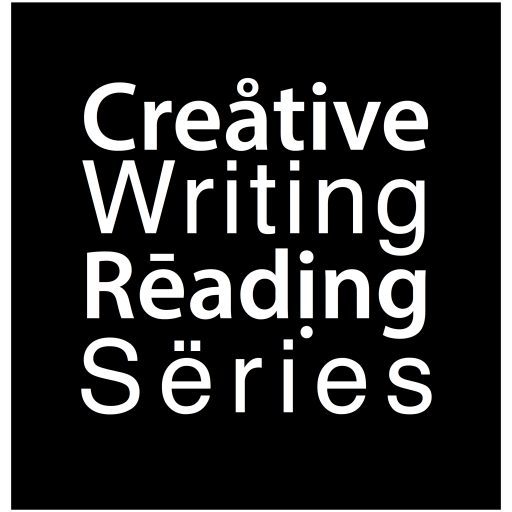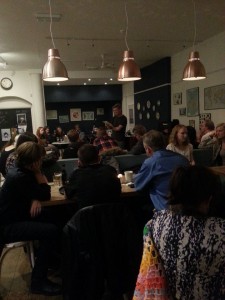The first poetry of this year’s series came from Peter Hughes. Peter is already well connected with the poetry scene at the University of Kent – his pamphlet Radioactive Relicts: Petrarch Sonnets, 117 – 136 recently came out with Litmus publishing, co-run by our very own Dorothy Lehane, and other Petrarch sonnets have appeared in ZONE, co-edited by me and Eleanor Perry. In his other guise, as small press publisher, Peter has published Ben Hickman’s recent pamphlet Later Britain, and Michael Grant and Ian Brinton’s translations of Yves Bonnefoy with Oystercatcher Press, Winner of the Michael Marks Publishers’ Award for outstanding UK publisher of poetry in pamphlet form. Oystercatcher pamphlets are consistently lovely publications from leading poets, and, Peter also being an excellent artist, they are often beautifully produced with Peter’s artwork – some of which we saw during the event.
Peter’s latest long project has been translating all of Petrarch’s sonnets – which will be produced as Quite Frankly: After Petrarch’s Sonnets by Reality Street in 2015 (http://www.realitystreet.co.uk), but Peter also read from his translations of Calvacanti, his Behoven (Oystercatcher Press, 2011) and The Sardine Tree (Oystercatcher), a life of Miro, and The Pistol Tree Poems (Shearsman, http://www.shearsman.com) – a collaboration with Simon Marsh in which each sent each other poems that decreased by a line each round – so that the collection ends with two one-liners. Peter’s poetry manages to at once be a very serious engagement with another artist – be it Miro, Petrarch, or Marsh and an original work that wears its learning lightly, even joyfully, something that makes the pleasure of his texts both immediate and lasting. Take this Petrarch sonnet from ZONE 2:
6 / 143
Per mezz’ i boschi inospiti e selvaggi
Thirty Seconds to Mars on the 13th
& the great Neil Young on the 25th
who help me sing along to memories
of other gigs we missed along the way
history seethes with dates & locations
in which she had nothing to do with me
such as now when my only defences
are built on the grammars of displacement
unplaced love spreads out through the surroundings
gilding the repossessed houses & shops
startling the small dogs pissing up bus-stops
making commercial music sound profound
energising all the little bushes
& helping me to grit my teeth like this
This engages with Petrarch, though Petrarch is, as Peter said a ‘springboard’ rather than a text to be faithfully translated, and that springboard allows both for complex relation and meditation on the concerns of the original text, a playfulness, and an immediacy of reference and vocabulary. And there are few poets who can marry the humorous with the profoundly moving as well as Peter can.
That most of Peter’s projects are based in engagement with other artists allowed for a very interesting discussion of how to go about creating the conditions for writing, and how to go about putting together a procedure or project that will result in a sequence, rather than an individual poem. Collaboration, creative translation, and various forms of limit were posited as points from which Peter’s own poetry had sprung – Behoven, for example, being a series of poems created from texts that Peter wrote in the spaces of time of the movements of Beethoven sonatas – thus they are both responses to the music and pieces produced under constraint. The constraint needn’t always be there in the finished piece – Behoven is edited, but its initial existence can set both the terms of engagement of a whole series of poems and provide a spur to writing that can often be hard to find – something worth bearing in min both for those who find it difficult to get started, and those MA students taking Poetry 2 next term – which focuses on ideas of sequence and/or long poems.
Peter also read with the poet Anthony Mellors the next night at Free Range – a weekly music and/or poetry event produced in collaboration with ZONE poetry that runs every Thursday from 8. Visit www.freerange.co for further details.
Kat Peddie

